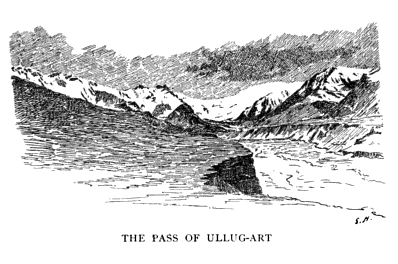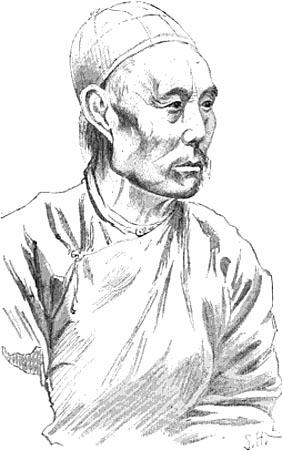
Sven Hedin's Expeditions
1983 -1935
Google
Map 4
To view his route click on
Google Map 4
Tashkurgan
Visit to
the Camp of the Anglo-Russian Border Commission
10
Jul - 3 Oct 1995
Kashgar 4
Oct 1894 –
10 Jul 1895
On July 10 1895 I left Kashgar with Islam Bai, two
servants, and six horses to explore the four-countries border region
around Tashkurgan and attend the Camp
of the Anglo-Russian Border Commission discussing the Border between
Russia, China, Afghanistan, and the Indian Raj.
Sven
Hedin, "Through Asia"
Flash Flood at Upal
11-12
Jul 1895
The next day, July 11th, we continued our journey towards the southwest, to the town of Upal (2000 houses), which is also a fortress manned by two hundred men.
At Upal I witnessed an occurrence which I had never witnessed before, but which takes place every year in these regions. After a heavy, continuous rain the water which drains off the adjacent mountain-sides gathers into a sil (flash flood or inundation), which in a few hours completely fills the river-bed, and may work very great destruction.
About seven o'clock we heard a distant booming. It came rapidly
nearer, at the same time increasing to a deafening roar. Down came
the flood, a stupendous mass of water, rushing on with inconceivable
violence, seething, foaming, and swiftly filling the river to the
brim. The inhabitants ran down to the river-bank, uttering cries of
alarm and gesticulating wildly. I and Islam Bai took our station on a
protected roof. The next moment the avenues of willows and poplars,
which lined both banks of the river, were covered by the flood. The
ground seemed to shake under the impact of such a mass of
unrestrained water. Clots of dirty foam tossed about on the tumbling
waves. The spray smoked along the flood like a moving shower of mist.
Tree-trunks, any amount of loose branches, haycocks, and other
movable objects danced along the tossing current, drove against the
banks, swung free, got caught in an eddy and plunged down out of
sight, rolled up to the surface again, and once more became the sport
of the irresistible flood. The bridge was broken down at the first
onrush, and swept away, swaying from side to side, while its timbers
creaked and groaned as it rolled over and over in the
water.
Sven
Hedin, "Through Asia"
Ulug-Art Pass
15 Jul
1895

Ullug-art is a perilous pass, the worst I have ever crossed in any
part of Asia. The weather was abominable. The wind, from the
southwest, drove the snow about us in blinding clouds. It was only by
snatches, when the snow-storm momentarily lifted that I was able to
get a glimpse of the magnificent panorama which lay spread out far
down below our feet. Here again, therefore, we unloaded the horses,
and the Kirghiz carried the loads for about half a
mile.
Sven
Hedin, "Through Asia"
Tashkurgan
27
Jul 1895
On July 27th, along with Mr. Macartney, I paid a visit to the village of Tash-kurgan. Both village and fortress presented a melancholy appearance. The whole neighborhood had been violently shaken by earthquakes, lasting from July 5th to July 20th, and every house in the place was utterly ruined; the few which still stood had gaping cracks in the walls, reaching from roof to foundations.
The last happened this morning at ten minutes past eight o'clock. I was sleeping on the ground, as I always did, and distinctly felt the impact at right angles to the longitudinal axis of the valley; in other words, it moved along an east-west line. The shock awakened in the mind an unpleasant sensation of anxiety. The earth seemed to heave and undulate. A detonation like a distant peal of thunder was plainly distinguishable. But everything was over in about a couple of seconds.

Mi
Darin the comandant of Tashkurgan
After looking at the damage done by the earthquake, I paid my
respects to the commandant, Mi Darin, and two or three other
mandarins, all of whom received me with great politeness. They had
equipped their yurt with a table, chairs, and opium couches, and
offered me all sorts of nice things. I took two or three whiffs at an
opium-pipe, but failed to detect wherein lies its fascination.
Sven
Hedin, “Through Asia”
Baosai-Gumbez
2-14 Aug
1895
MaCartney urged me to come with him to the meeting of the Internationl Covention, but I had my mind on the sources of the Yarkand-daria. With a ruse I turned south. Two days more brought me to the northern foot of the Hindu-kush mountains. There I stayed twelve days, making short excursions, exploring the valleys of the more important head-streams of the Khunserab, and climbing the pass of Khunserab (15,780 feet), whence I looked down upon the valley of Kanjut.
From the same place I endeavored, but endeavored in vain, to find a
practicable path to the upper Yarkand-daria, over the passes of
Uprang, Kara-su, and Ilik-su. The upper part of the Yarkand-daria is
likewise known as the Serafshan or Raskan-daria. In every quarter I
inquired I was given the self-same answer: I could readily enough
reach the river in the course of a few days, but there was no place
where it could be crossed during the summer. The deep, narrow gorge
of the Ilik-su had in places been so terribly convulsed by the recent
violent earthquakes that it was impossible for any animal, even for
yaks, to traverse it: it was only practicable to men on foot. Thus I
had got myself into a sort of mountain cul-de- sac. The only
accessible districts which I had not yet explored were
towards the west.
Sven
Hedin, "Through Asia"
Camp of the Anglo-Russian Border
Commission
17 Aug - 14 Sep 1895
On August 17th we reached Chakmakden-kul (the Lake of the Fire-steel), in which the Ak-su or Murghab has its origin. Knowing that the Anglo-Russian Boundary Commission were working at Mehman-yolli (the Guest Road), a small transverse valley situated only a day's journey towards the northeast, I could not resist the temptation to pay them a visit. But I did not like to come down suddenly and without warning upon the Commissioners while in the midst of their delicate labor of defining the boundary from Victoria Lake to the Chinese frontier. I wrote to the head of each Commission asking if they had any objection to receiving visitors. My jighit (courier) brought back a cordial and pressing invitation from both chiefs. Accordingly, on the evening of the 19th, I pitched my tent at Mehman-yolli, on neutral ground between the Russian camp and the English camp.
I was already acquainted with the head of the Russian Commission, General Pavalo-Shveikovsky, governor of Fergana, my friend and benefactor. General Pavalo-Shveikovsky welcomed me with open arms. We sat talking until a late hour of the night. The following morning I paid a visit to General Gerard, and met with a similar kind and friendly reception from him.... The Russian officers' mess was located in a large, tastefully decorated yurt; the Englishmen had theirs in an immense, yet elegant, tent. Invitations to dinner from the one party or the other were an almost every-day occurrence. As for me, I spent one day in the English camp and the next in the Russian, and so on alternately.
Shortly after my arrival among them, General Pavalo- Shveikovsky gave a grand evening entertainment. At nine o'clock the Englishmen came over wearing their handsome, yet serviceable, full-dress uniforms. In front of each of the Russian yurts was stationed a guard of Cossacks, holding lighted torches, which shed a wild and tremulous flood of light across the bank of the Ak-su. The guests assembled in the large reception yurt of white felt. The interior was draped with Oriental cloth and variegated carpets from Kashgar. The table glittered with bottles and decanters of European wines and liqueurs; while dotted about among them were dishes of solid silver, heaped with grapes, apples, and duchesse pears from the governor's own garden in Margelan. We took our seats in light and comfortable tent-chairs, lined with rugs and so forth. While some of the company played cards, the majority kept up an animated conversation in different languages. Meanwhile the military band went through a long programme of Russian- melodies, well-known marches, and " God Save the Queen"; and heard under such circumstances, at such a lofty altitude on the Roof of the World, the music was especially charming. After supper, the Russian general accompanied his guests by torchlight to their own quarters.
A few days later General Pavalo-Shveikovsky invited us all, including the Afghan Commissioner, to a splendid dejeuner. Champagne flowed like water, and healths were drunk to all the world, even to the Crustaceans of the Indian Ocean....
During the following days the frontier pillars Nos. IX. to XII. were erected, thus finishing the labors of the Commission. They had defined and marked the frontier between England's and Russia's possessions on the Pamirs, and had nothing more to do except to strike camp and return home.
The festivities included a sakuska, or ante-table of Russian usage, consisted of caviar, preserved meats, Swiss cheese, pate dc fois gras, and almost every conceivable delicacy, while for dinner we were served, among other courses, with crayfish soup, lobster mayonnaise, asparagus, and so forth. The only thing which failed to make a due impression upon me was the glaces; I had been completely spoiled for glac'es by the glaciers on the Roof of the World. The wines were not from Turkestan, but from the choice vintages of France.
But my sense of duty got the upperhand at last. My road
lay towards the east. I returned to Kashgar by a different route
south of Mustagh Ata.
Sven
Hedin, "Through Asia"